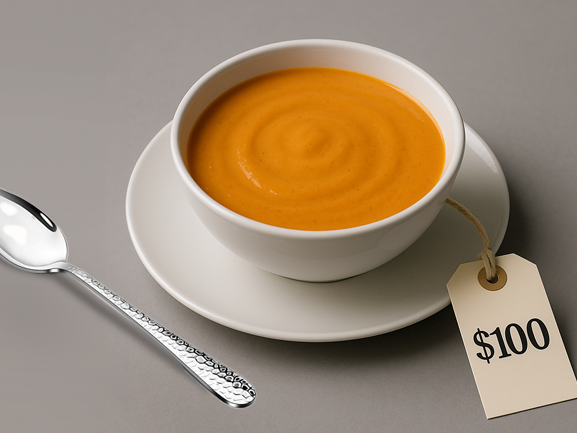As the world burns, the rich raise a glass — and the bill is paid in conscience, not cash, writes Dr Rosemary Sorensen.
WHAT’S THE WORD for when the gap between what’s happening in the world and what tiny elite groups focus on is so enormous it’s a bottomless pit?
Is it merely grotesque? Does the definition of delusional fit? Or do we just sigh and accept it as normal human behaviour?
Trying to work out how we can go on chatting in newspaper columns and social media about summer wardrobes and food trends, I came up with my own way to describe it: osso buco thinking. It’s the dinner party way of doing things: Tut tut, isn’t Trump awful the way he’s destroying America? Oh dear, did you see the photos of that boy splattered with guts in Gaza? Excellent osso buco, Antony, do you use that sustainably-sourced butcherarium in North Fitzroy? Pass the Grange.
As we confront, or turn away from, the daily news of violence and destruction, it does make some sense to keep and even foster the nice things, a sort of bulwark against the hard, cruel, relentless pounding. But we’re past that now. We do know that, in wars past, media reports were both delayed and managed, so that populations not in the conflict zones were kept to some degree ignorant of the horror.
My grandfather, who earned some medal for some act of bravery in the Middle East in the First World War, returned, went bald almost overnight, then kept silent about what had happened for the rest of his (too short) life. We kept that medal in a carved stone box, which was lost when my grandmother died. Only through reading, not from my grandfather’s experience, did it become possible to imagine what those soldiers and civilian populations went through.
Now, we can see the images immediately. And the articles and books are there for us to read, even as the denials of violence – whether in Gaza or America or wherever else fascism is jackbooting along the streets – are reported faithfully by weak, corrupted media.
So, here’s my question: should the few remaining competent news outlets suspend the “lifestyle” stuff, at least until we wake up to some signs that this polluted tide is turning?
Here’s the “story” that pushed my tolerance over the edge — in The New Yorker, a review of the Waldorf-Astoria’s new Lex Yard restaurant:
‘A carrot-coconut soup, soft as sunshine and gently sweet, poured tableside over ribbonlike curls of carrot and turnip, shaved to translucent thinness, made me sigh with pleasure. A plump fillet of halibut, pan-roasted in olive oil until tender and satiny, was a brilliant shock of white in an elegant magenta consommé of dashi and beetroot.’
This is not satire, although if it had popped up in the McSweeney’s Bluesky feed, it would have made sense.
The review is ridiculous, but comes from that food-porn tradition that used to be sort of entertaining, even for those who wouldn’t want to pay exorbitant prices for a shave of carrot and a fish in broth. What is galling to the point of nauseating is the accompanying photographs of the renovated New York hotel. It’s not nearly as awful as Trump’s Oval Office, which shines with more and more gilding every time he humiliates another foreign head of state there. But it’s pretty darn awful.
If New York is a special case, built on the very premise that greed is prestigious, it’s still weird that we let the Neros of the world fiddle while the planet burns. It sets the tone, too, for places where the wealth divide is not quite so huge and the pretensions comparatively modest.
And so, here in “Oi Oi Oi”, we have the comforting tradition of The Age’s Good Food section, still earnestly eating their way around the filthy mess the world is in, these lifestyle pages valiantly confounding the notion that our lifestyles are lighting fools the way to dusty death.
A recent review of the Cherrywood at Residence restaurant at the University of Melbourne’s Ian Potter Gallery muses about ‘whether chefs are artists’ and decides that:
‘Art reflects culture, it brightens our cities and our lives, it gives us pleasure, and it challenges us to understand the experiences of others.’
So much to wonder about in that definition of art – and how a plate of pasta, too, might challenge us ‘to understand the experience of others’.
I think we do have to carry on, with the everyday as well as the lifestyle culture stuff that is the cushion against the awful realisation of just how vile people can be. But, at the same time, we need to stop carrying on, or to modify how we carry on, to somehow acknowledge what is happening right now to those very cultures that spawned hotels like the Waldorf-Astoria and, down the chain, distractions such as arty food.
Life, as Malcolm Fraser once intoned, rather inappropriately, wasn’t meant to be easy. It sure does seem that, for large chunks of the world’s populations, that is so. And the question is, is it ok for the few of us for whom it is relatively easy either not to notice or to notice and not let it affect us.
How you’d register that the world is changing while you taste the consommé, I’ve no idea. That Cherrywood reviewer does register something when she notes that the restaurant serves ‘a very rich chicken broth poured from a kettle over aromatic tarragon into tiny cups. “I could drink a whole mug of this,” my dining companion said, to which I replied, “Yes, and it would cost you $100”. At $10 a shot for the broth, it’s a lovely but very expensive couple of sips.’
Expensive — that’s what this kind of dining and thinking is, but not just in monetary terms. It’s ethically ruinous.
Dr Rosemary Sorensen is an IA columnist, journalist and founder of the Bendigo Writers Festival.
Support independent journalism Subscribe to IA.
Related Articles





